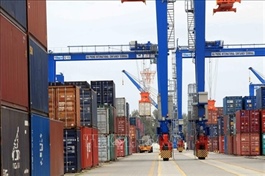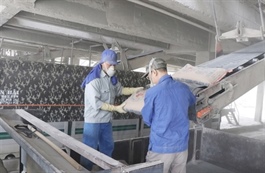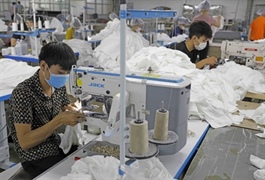Pro-business landscape heads industrial production wishlist
Pro-business landscape heads industrial production wishlist
Despite a slowdown in industrial production, confidence among the business community is expected to continue climbing, which is backed by government efforts to provide a more friendly business environment.

After the economy grew 5.05 per cent in 2023, the government has asked authorised agencies to take drastic action to continue economic growth with a focus on promoting confidence and industrial production, which remains feeble amid increasing risks facing the economy.
All are aimed at reaching a growth rate of 6-6.5 per cent this year. The government has required close monitoring of global developments, as well as the fiscal and monetary policies of the country’s main trading and investment partners.
Authorities at all levels have been ordered to “concentrate on reviewing, cutting, and simplifying administrative procedures, and business regulations”, while a ban is imposed on enactment of new unnecessary, unsuitable, and infeasible procedures, regulations, and standards.
They are also requested to continue reviewing and improving legal mechanisms, policies, and regulations for businesses, and removing difficulties to recover and develop different types of markets, especially in corporate bonds, land use, real estate, labour, science and technology, and energy.
Recovery hopes
The government reported that Vietnam’s industrial production in Q4 of 2024 grew “more positive” than that in Q3, with an added value estimated to climb 6.86 per cent on-year. The on-year increases of such a value were 5.51 per cent in Q3, 0.86 per cent in Q2, and minus 0.73 per cent in Q1. In 2023, it ascended 3.02 per cent on-year, in which the manufacturing and processing sector expanded 3.62 per cent.
The on-year added value of this sector rose from minus 0.45 per cent in Q1 to 0.46 per cent in Q2, 5.59 per cent in Q3 and 7.97 per cent in Q4.
“Enterprises’ production and business activities have been on an uptrend, becoming more positive,” said Minister of Planning and Investment Nguyen Chi Dung.
State-run Vietnam Electricity (EVN) reported that all of its activities have increased in 2023. The group’s total electricity output, both domestically-produced and imported, is estimated to hit 280.6 billion kWh, up 4.56 per cent on-year, with commercial electricity is estimated to be 251.25 billion kWh, up 3.52 per cent, and expected to increase to up to 269 kWh in 2024. In 2023, EVN’s total capital is estimated to stand at nearly VND91 trillion ($3.84 billion), which is expected to increase to over $4.3 billion in 2024.
According to the General Statistics Office (GSO), in 2023, business confidence kept growing. The Vietnamese economy witnessed over 159,300 enterprises newly established, with total registered capital of $64.2 billion and employed 1.05 million individuals – up 7.2 per cent in the number of enterprises, down 4.4 per cent in capital, and up 7.3 per cent in workers, compared to last year.
“Production and business activities continued to recover, especially the service sector, which is forecasted to be more active going forward,” said Nguyen Thi Huong, general director of the GSO.
Meanwhile, a few weeks ago, the AHK World Business Outlook Fall 2023 survey was unveiled, providing valuable insights into the perspectives of German investors worldwide and in Vietnam.
The survey, conducted from September 25 to October 20, reveals that 42 per cent of German companies in Vietnam prioritise diversifying production and manufacturing, indicating a strategic focus on varied production capabilities. Sales and marketing (41 per cent), services (35 per cent), and logistics (31 per cent) closely follow, underscoring a comprehensive approach to business development.
In 2023, Germany has taken a bold step in solidifying its presence in Vietnam. A total of $366.3 million worth of German newly registered and newly added capital, capital contribution, and stake acquisition. Cumulatively, German firms have invested in 463 projects in Vietnam, registered at a total of $2.68 billion.
“Vietnam’s government has implemented a suite of measures designed to engage foreign investments. These include tax incentives, preferential tariffs, and streamlined bureaucratic processes. Moreover, transparent regulatory frameworks protect investors’ interests and provide a stable foundation for long-term collaboration,” said Marko Walde, chief representative of AHK in Vietnam, Myanmar, Cambodia, and Laos.
Confidence among European businesses operating in Vietnam is showing signs of resilience as the latest Business Confidence Index (BCI), released last week by the European Chamber of Commerce in Vietnam and conducted by Decision Lab, reached 46.3 in Q4 of 2023.
More enabling environment
Last week, the government also issued Resolution No.02/NQ-CP on key tasks and solutions to improve Vietnam’s business climate and national competitiveness in 2024.
It requires leaders of ministries and localities to put a pivotal priority on improving the business climate. They are tasked to enact their own programmes and action plans to implement this resolution, with detailed tasks and how to implement them. All examination and supervision results must be announced openly.
“We pledged to create an open investment environment and complete the legal system for effective investment, in the spirit of harmonising interests and sharing risks between the state, individuals, and businesses,” PM Chinh said.
Under the BCI, valuable insights emerge on the regulatory challenges perceived by the business community in Vietnam. Topping the list, a significant 52 per cent of respondents identify “administrative burdens and bureaucratic inefficiencies” as one of the top three hurdles, spotlighting the impact of red tape on business operations. Following this, 34 per cent of businesses highlight “unclear and variably interpreted rules and regulations” as a major challenge, emphasising the need for clarity and consistency in legal frameworks.
On the solutions front, a notable 54 per cent of respondents call for “administrative and bureaucratic streamlining”, indicating that easing bureaucratic processes could significantly enhance the business environment. Additionally, 45 per cent stress the importance of “strengthening the legal system and regulatory environment”, while 30 per cent see “infrastructure development, including roads, ports, and bridges” as essential for foreign investment attraction.



























